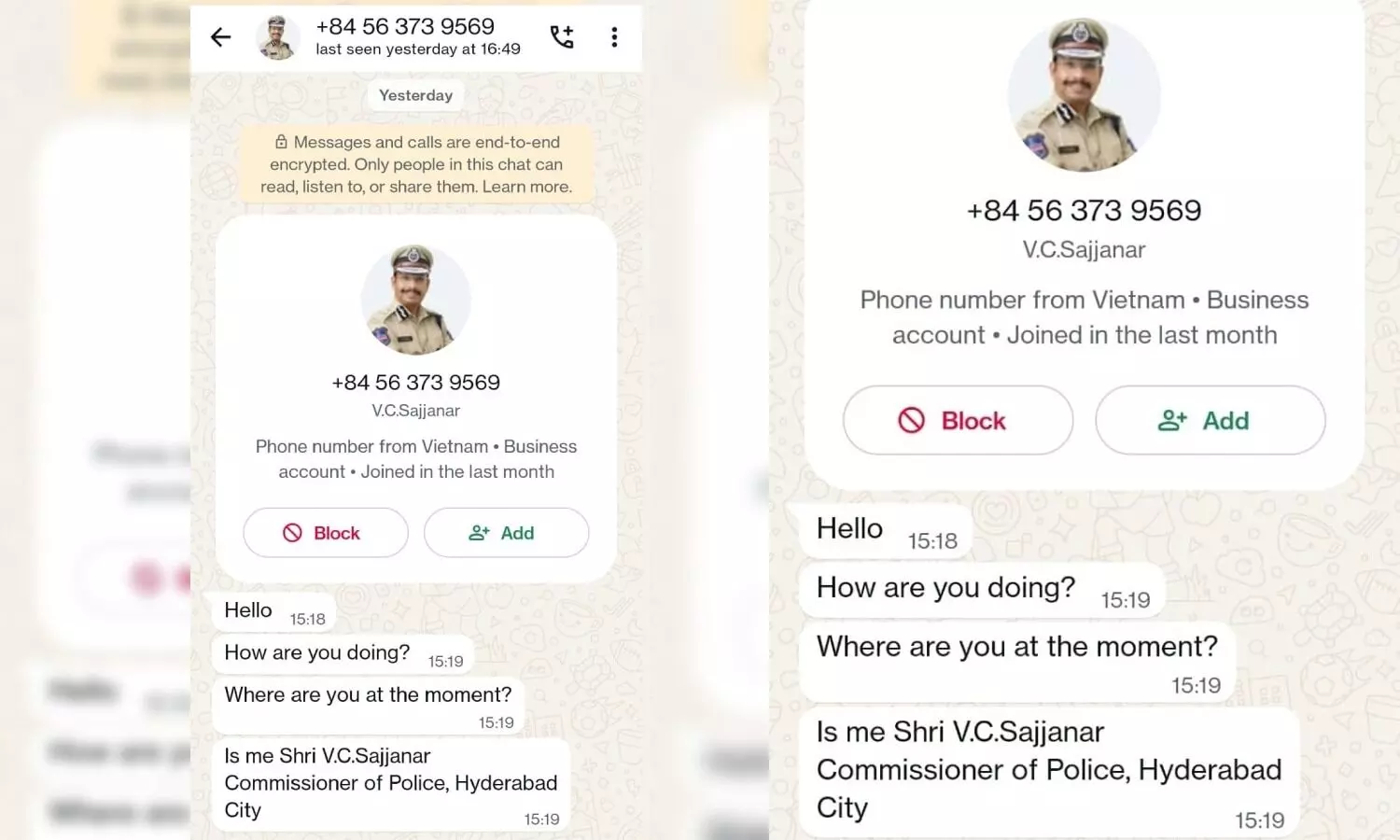Cyber fraud alert: WhatsApp scammers impersonate Hyderabad CP VC Sajjanar
Sajjanar personally alerted the public about the scam and clarified that he has no connection whatsoever with these fake profiles
By - Newsmeter Network |
Hyderabad: In a shocking case of digital impersonation, cybercriminals have created fake WhatsApp accounts using the photograph of Hyderabad Police Commissioner VC Sajjanar as the display picture.
The fraudsters, posing as the Commissioner, have reportedly been sending messages to people to deceive or extract money by exploiting the officer’s identity.
Commissioner Sajjanar personally alerted the public about the scam and clarified that he has no connection whatsoever with these fake profiles.
“It has come to my notice that some unknown individuals are using my photograph as a WhatsApp DP and sending messages to people. These are fake and completely fraudulent,” he said, urging citizens not to respond to such messages and to block and report the numbers immediately.
‘Your awareness is the best defense’
Commissioner Sajjanar reminded citizens that vigilance is the strongest safeguard against online scams. “Your awareness is your protection. Do not engage with suspicious messages or unknown contacts, even if they appear familiar,” he said.
He also urged people to educate family members and elderly citizens, who are often more vulnerable to online deception about the growing menace of cyber fraud.
Police step up Cyber Vigilance
In light of the incident, Hyderabad Police have intensified efforts to track down those behind the fake accounts. Cyber Crime teams are monitoring similar fraudulent activities and tracing the origin of such messages.
Officials reiterated that the police would continue to strengthen cyber awareness campaigns to ensure citizens remain safe in the digital space. “Technology is a powerful tool, but it can be misused. Stay informed, stay alert, and don’t let fraudsters take advantage of your trust,” the Commissioner added.
Growing trend of impersonation scams
According to cybercrime officials, impersonation cases on social media and messaging platforms are on the rise. Fraudsters often clone photos of well-known personalities, especially government officials, police officers, or celebrities to gain trust and mislead victims.
“These criminals depend on people’s tendency to trust familiar names and faces. Once they win that trust, they manipulate victims into transferring money or sharing personal information,” said a senior official from the Cyber Crime Wing.
The officer added that such scams are becoming sophisticated, with fraudsters using genuine-looking profile pictures and status messages to appear authentic.
Public advised to exercise caution
The police have urged citizens to verify before trusting any message that claims to be from an official or known individual. People should confirm the sender’s identity through a phone call or in-person conversation before sharing any details or transferring funds.
Officials also advised against sharing personal, banking, or OTP information on WhatsApp or any social media platform. “Even if a message seems genuine, always double-check. It’s better to take a few minutes to verify than to regret later,” said an officer.
Steps to stay safe from Cyber Fraud
Authorities have shared a set of safety tips for the public:
Verify the source before responding to any unexpected message.
Never share sensitive information or documents through messaging apps.
Block and report suspicious accounts immediately.
Avoid clicking on unknown links sent via messages or emails.
Enable two-step verification on WhatsApp to secure personal accounts.
Where to report Cyber Crimes
Citizens who come across such fake profiles or fall victim to cyber fraud can report the issue through official channels.
Complaints can be registered by calling the Cyber Crime Helpline 1930 or by visiting the National Cyber Crime Reporting Portal at cybercrime.gov.in.
Police officials have assured that all reported cases will be investigated promptly. They emphasized that timely reporting and public awareness are key to curbing such crimes.